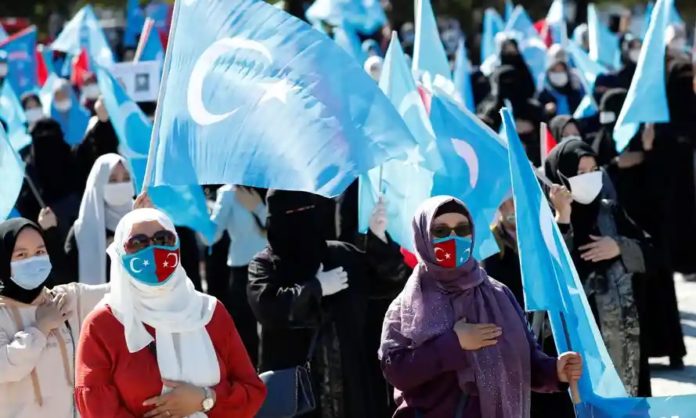(COLUMN)
(By Mamtimin Ala)
Denial of genocide is an essential part of its success. Usually, the force of denial is strengthened proportionately to the recognition of genocide by more people, institutions, and governments. Genocide denial further mocks the intelligence of observers and insults the victims. Furthermore, it distorts reality, dilutes severity, hides hesitation, and encourages new violence. This is currently the case of Uyghur genocide denial.
The recent re-assertion of the US State Department, naming what is happening in Xinjiang (aka East Turkistan) as genocide, indicates that Uyghur genocide denial may be minimized drastically or lose its appeal to wider public attention in the future. However, the force of denialism is far more complex than it appears and works. The Canadian Parliament unanimously voted for and, subsequently, declared China’s treatment of Uyghurs genocide. The positions of these two key Western democracies appears to have sent a powerful message about one of the most horrific human rights crises of the 21st century.
However, neither heads of state, US President Biden and Canadian Prime Minister Trudeau, have endorsed formally or informally these declarations. In the Canadian vote, the cabinet members of the Trudeau government were regrettably, if not surprisingly, abstained. Further, neither has proposed any pathways to take their governments from a critical declaration to definitive action against and termination of this ongoing genocide. Instead, they uttered quite contradictory remarks, plunging all public expectations of their action into confusion. President Biden, whose election team called the Uyghur crisis a genocide in August 2020, utilized highly ambiguous language, the failure of Xi Jinping to speak on the genocide of Uyghur Muslims part of a “different norm.” This implicates that China has a unique way of dealing with its own internal affairs, and while conflicting with the American way, is their prerogative to do so. Prime Minister Trudeau told reporters in a slightly less ambiguous language, “genocide was an ‘extremely loaded’ term and that more study of the issue was needed before a determination could be made.”
In the context of the wide-spread silence of other world leaders, their remarks about the Uyghur genocide still carries some weight. Their remarks clearly state the severity of the Uyghur crisis but ambiguously remain non-committal to its nature as genocide. It could be argued this ambiguity is the conventional art of playing politics as it deals with uncertainty through prudence while congruently reconciling competing interests. Being ambiguous but not critical masks their hesitation facing the ire of a powerful perpetrator, China, with which other critical matters are not resolved yet, respectively the aftermath of the unresolved trade war as the legacy of the previous US President Trump and of the diplomatic spat over the arrest of Huawei executive, Meng Wanzhou. To add the Uyghur genocide to these unresolved matters will certainly make their relationships with China ever more tense and burdensome.
However, if we acknowledge the Uyghur genocide without putting it in any existing context as a serious crisis needing urgent attention, then the ambiguity manifested in their responses appears to be a subtle form of denialism. In his denialism, President Biden endorses relativism, evoking a culture of measured tolerance and unique understanding of the Uyghur genocide from the perpetrator’s perspective, as opposed to the victim’s. In doing so, he sits dangerously on the fence when universal human rights values are under serious attack. PM Trudeau, on the other hand, displays a huge weight of solemn deliberation, intending to show, somehow dishonestly, that any hasty judgment on such a sensitive, serious, and substantial issue costs a fortune. However, this sets him in sharp contrast to the landslide judgment of more than 200 Members of Parliament. Similarly, both leaders seem prudent and, more fundamentally, reluctant to rise to the challenge of carrying out a historic duty to act and end the Uyghur genocide.
In the end, their behavior, words and promises, constitutes a partial denial of the Uyghur genocide without fully denying it, only by accepting it conditionally. As a result, they mask their deepest fear of the powerful perpetrators internally and tries to mitigate the possible public outrage externally. Their reaction, in the end, is harmful in delaying further the formulation of an effective action plan against this genocide. This delay only encourages the perpetrator, adds more victims, and disappoints survivors.
One may stipulate this an improvement on other world leaders who are either silent or amnesiac over the Uyghur genocide. This argument is valid when applied largely to the leaders from the Muslim world. The notable example of this is the silence of Turkish President Recep Tayyip Erdogan, who called the 2009 Uyghur massacre a kind of genocide rightfully and forcefully. However, he has surprisingly remained silent over the Uyghur genocide since 2018, apart from his “Happy Xinjiang” comment allegedly attributed to him during his visit to China in 2019, and quickly corrected by Turkish authorities after it was published in Chinese media. Praised by some Turkish Islamists and nationalists as a guardian of the Muslim world after he forged an alliance with the MHP called the People’s Alliance, Erdogan is set to be more powerful a figure at home, in the Middle East and beyond. So is his silence, sending an equally powerful message as was expressed in the position of this party, AKP, on Twitter that Turkey supports the one China policy and its fight against terrorism. This announcement tacitly indicates that China’s suppression of Uyghurs is rationalized and accepted by Turkey.
Another form of denial is the “let the dead testify” fallacy. French philosopher Lyotard criticized a revisionist historian Faurisson’s demands for evidence of the Holocaust. He proposed the only acceptable evidence of the existence of gas chambers would be eyewitnesses who were themselves victims of the gas chambers. It is a kind of Catch-22, as an inescapable dilemma – what is to be proved is part of the proof. This fallacy is manifest in the argument of the Leader section of the February 13th issue, The Economist, which “cautioned” that genocide is a wrong word for the horrors happening in Xinjiang. The Economist further argues that it is only a “crime against humanity” because mass killings in Xinjiang did not happen. However, The Economist has offered no counter-evidence for its assertion.
As a matter of fact, we really do not know how many people have died in China’s Xinjiang camps so far. But we know that leaked Chinese documents revealed the CCP’s clear instructions for camp administrators: “show absolutely no mercy” and “allow no escape.” If China is not committing mass killings in an abhorrent and merciless way, why is it afraid of inmates escaping? What is there to hide, why is it hidden, and from whom? The harrowing experiences of Uyghur and Kazak camps survivors paints a very grim and dreadful picture—the CCP is systematically eliminating camp inmates in a cold-blooded manner. The whole fallacy is the unacceptable and even outrageous pretention that like any ordinary crime, genocide must be established with provision of sufficient evidence. This request does not take into account the environment of the Uyghur genocide as absolutely secretive, allowing no leakage of information.
The last point of Uyghur genocide denial is the “seeing is believing” fallacy, which has in fact been frequently used by both perpetrators and some seemingly “objective” and “unbiased” ordinary foreigners, most of whom visited Xinjiang. Those invited to see Xinjiang through their naked eyes to check if there is an alleged genocide happening. This is devoid of any credibility as China only invites “safe” and “trustworthy” people (foreign journalists and China critics not included) to the pre-designated places without rights to free movement as it did with the WHO delegation to Wuhan. The whole visit is controlled—what and who is seen, and what is discussed. Of course, these visitors are shown a perfect illusion they have visited everywhere in Xinjiang in advance, being sufficient to come up with an “independent” view that no genocide is observable. Further, they propagate to others genocide must be seeable; if not, then no genocide is believable. However, they never mention the fact it is audible from the victims and witnesses.
The despicable part of this fallacy is the pretense of a sincere empiricist. However, it manipulates the truth by hijacking a scientific understanding that what is observable is measurable and what is measurable is real. What is omitted here is the case that the first premise is already controlled by the perpetrator and so is the result. If what is seeable is pre-arranged, then the result of it is consequently pre-determined. Therefore, it is pessimistic but perfectly realistic that any institutionalized visit by governmental or non-governmental organizations to Xinjiang with the invitation of the Chinese government yields no valuable results. On the contrary, they may even be used and abused to counteract leaks about the horrific life inside camps, prisons and forced labor factories.
From the perspective of the perpetrator of this genocide, denialism is a powerful tool to avoid taking responsibility and evading criticism of it. The most important part is repeating the lies constantly and propagating the nature and scope of discourse around the genocide as a form of manipulation of truth. Concentration camps of the Uyghur genocide, initially rejected by Chinese authorities, are described as re-education centers aiming to equip Uyghur and other Turkic nationalities with essential employment skills for a better life. These lies not only distort reality but recreate a parallel world to hide the real world, that world that is Orwellian by nature. When exposed or rejected forcefully, China utilizes measures to either discredit, vilify, or threaten them with retaliations.
For example, when the recent Uyghur genocide survivors Gulhabar Haitiwaji, Tursunay Ziyawudun and Kalbinur Sidiq shed light on the widespread and horrific sexual violence inside the camps in collaborative manner, the Foreign Ministry of the Chinese government has vilified them as “liars.” The Chinese government went further to verbally attack on one of the witnesses through character assassination that “everyone knows about her inferior character. She’s lazy and likes comfort, her private life is chaotic, her neighbors say that she committed adultery while in China.” Adrian Zenz, a well-known expert on the Uyghur genocide, has recently been discredited by the Chinese government as data abuser: “A careful review of Zenz’s research shows that his assertion of genocide is contradicted by flagrant data abuse, fraudulent claims, cherry-picking of source material, and propagandistic misrepresentations.”
China’s Uyghur genocide denialism swings constantly between stark denial and conditional acceptance of it, depending on who the critic is and how powerful and revealing the critique is. The important part of acceptance is simultaneous with its justification of the Uyghur genocide in the context of fighting against Uyghur terrorism as an act of self-defense. If anything goes beyond this context, the last resort for China is to threaten the critic with the prospect of severe retaliation, diplomatic, financial and political. So far a successful deterrence tactic to silence most countries over the Uyghur genocide has been effectively at work. Sometimes, the Chinese government uses the relatives, including parents and siblings, of the Uyghur genocide survivors, to discredit them, openly criticizing them on a pre-arranged propaganda TV programs that they are lying. This is a psychological tactic to put enormous pressure on them to be silent over the abuses they went through in China.
As opposed to its apparent defiance and uncompromising attitude, China, sometimes, plays the victim game, stating the Uyghur genocide is an evil scheme of anti-China forces to keep it from becoming the world’s superpower. It paints all serious critiques as malignant and destructive as possible, a position reinforcing its self-justification as a victim of both terrorism and hostile forces of the West. In this sense, the repeated lies are supported by foreseeable retaliations and victimhood positions, prohibiting any critical enquires and imposing silence on critiques.
The complexities of recognizing the Uyghur genocide are commensurate with the power of denialism at different levels, actors, and reasons. The scope and prevalence of this denialism can also be carried out by powerful trolls on social media. The aim is to divert public attention away from the Uyghur genocide (including whataboutism), to dilute its severity and blame Uyghurs for being Muslims (overtly or covertly associated with terrorism and separatism), and to provoke lack of reciprocity of Uyghur sympathy for other campaigns, e.g., the BLM movement. Though the factual nature of the Uyghur genocide remains strong, these denial activities are still operative and effective in some parts of the world and among some people. More importantly, when it is adopted by the policy makers, it may provide an excuse to appear doing something while doing nothing to stop it and, therefore, a key ingredient to the success of the Uyghur genocide.
In fine, denialism is unavoidable when it comes to revealing and acting on the heinous scheme of one of the superpowers, China. It is not the case that the relative transparency obtained on social media, independent and objective reports and even witness and victim statements can expose the lies, cover-ups and manipulation of denialism and hence can dampen its efforts to misguide public opinion. Instead, all these facilities and resources can also be misused and abused by the perpetrator to hide the crimes it is committing.
On the other hand, denialism must not be used as an apologetic or tolerant act to delay or deny the delivery of justice over the Uyghur genocide. It should reinforce our conviction that the genocide is real and negation of it is also real as part of its overall mechanism. To dismantle the lies, deception and manipulation of denialism is critical to acknowledge and finally end the Uyghur genocide which is still ravaging Uyghur life mercilessly. As such, to fight against denialism should be taken into the overall strategy to put an end to the Uyghur genocide and beyond.
(The author is currently residing in Australia and holds a Ph.D. in Philosophy from Katholieke Univerviteit Leuven, Belgium)






